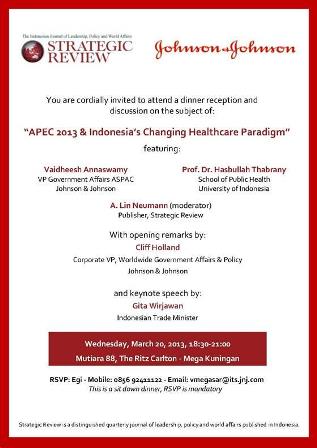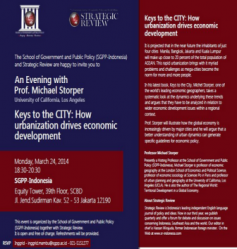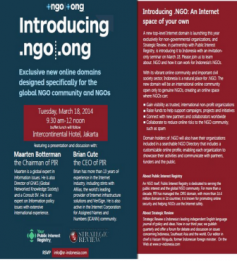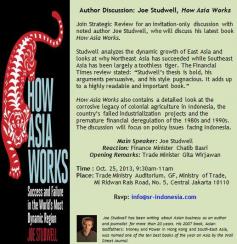Vaidheesh Annaswamy, Prof. Dr. Hasbullah Thabrany
Location: The Ritz Carlton, Mega Kuningan
With Indonesia promising universal health care by 2014, Strategic Review and Johnson & Johnson held a dialogue to discoss the challenges of the new system.
Insurance-based system is focus of a new vision
By Yvonne Chen

In a country where the majority of the population is still poor and often cannot afford to seek medical treatment, affordable healthcare is a glaring need when millions of people literally live or die based on their income levels.
With this in mind, last month US pharmaceutical giant Johnson & Johnson and the Indonesian policy journal Strategic Review hosted “APEC 2013 and Indonesia’s Changing Healthcare Paradigm,” a dinner discussion at the Ritz-Carlton-Mega Kuningan hotel in Jakarta.
The event brought together government officials and healthcare industry players to discuss the issues raised in trying to improve healthcare here.
The evening was opened by Clifford Holland, Johnson & Johnson’s Corporate Vice President for Worldwide Government Affairs & Policy, who was visiting Indonesia. US Ambassador Scot Marciel also spoke.
Distinguished academic and former minister of education and defense Juwono Sudarsono, an advisor to Strategic Review, told the gathering that healthcare is both a vital trade issue for multinational companies, and a service industry that needs to achieve greater competitiveness.
He also emphasized the need to focus on the poor.
“Of Indonesia’s 245 million people, 60 million have middle-class spending power.” This segment of the population is often pointed to as the current “market” for health care consumption, Juwono said.
“But 130 million live below the poverty line and few of them have access to healthcare.”
Juwono said that Indonesia is struggling to meet the 2015 deadline for the United Nations’ Millennium Development Goals on healthcare, noting that there are 1.3 million women in Indonesia who still don’t receive proper maternal care. One mother dies giving birth every hour, he said.
“That is the reason why it [universal healthcare] is in our constitution, and why uplifting the poorest of the poor is a priority for our presidents. It is why labor unions asked for direct implementation of social security,” he said, noting large worker demonstrations held in recent years demanding universal health care and social security.
“So I say, forget the 60 million who sustain growth. We must deliver to the 130 million who remain poor. That’s why I applaud Johnson & Johnson’s West Java program for mothers [a project to support midwives].
“We cannot afford to lose a generation of children.”
Vice Minister of Health Ali Ghufron also spoke about the urgency of healthcare, especially for the poor.
“One of the 100 richest men in the world is Indonesian,” Ghufron said. “But 130 million remain poor. Of those, only 76 million receive free healthcare. This year we are adding another 10 million.”
Ghufron acknowledged that bureaucratic bottlenecks and worries about costs can be an obstacle when moving toward a more just system. The ministries of finance and health “sometimes don’t understand each other. The Ministry of Health sees it as an investment, while the Ministry of Finance sees it as additional spending.”
“There are two things about costs: standard of cost and timely access to care, so there is also an economic factor involved,” Ghufron said.
A panel discussion featured Vaidheesh Annaswamy, Johnson & Johnson’s Asia regional vice president for government affairs, and Professor Hasbullah Thabrany of the School of Public Health at the University of Indonesia.
Hasbullah, one of the architects of the government’s universal health insurance scheme, said the 2014 introduction of the plan should raise both heath care standards and revenues for healthcare providers.
“We are entering the second major change in healthcare,” he said. “Under Suharto and the New Order, there was a massive expansion of healthcare facilities in the 1970s and 1980s; the second big change is happening now.”
Hasbullah, who was a member of the ground-breaking Task Force for Social Security Reform established by former President Megawati Sukarnoputri in 2004, explained that the new system is insurance based, unlike countries such as Malaysia and Sri Lanka that provide free public healthcare for all citizens.
In Indonesia, where healthcare investment is traditionally driven by the private sector rather than government support, only 3 percent of GDP goes to healthcare spending. For that reason, he said, an insurance-based system made more sense than trying to create a government public health care model at this late date.
In designing the system, Hasbullah said he realized it needed to be market-driven if healthcare services are to be financially sustainable in the long-term.
He emphasized that under the new system, public sector hospitals and clinics will compete with the private sector for patients, who will direct their spending in a free market for services.
“The single payer system counteracts any monopoly powers that the public sector would otherwise have because patients can choose to use their allowance with private providers.
“The single payer system benefits both suppliers and consumers,” he said.
Yvonne Chen is a policy advisior to AmCham Indonesia. This artcile first appeared on AmCham Indonesia's Web site.










 resized.png)
